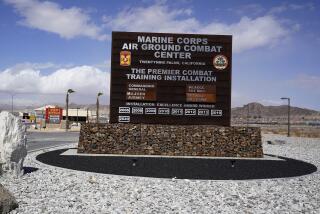Not at Ease
- Share via
CAMP PENDLETON — The linebacker with “USMC” tattooed below his wife and daughter’s names on his biceps barked out the coverage. Then he zeroed in on the quarterback for a sack.
As the sun sank behind the stands at Area 11 Field last week, the team in black and white, Transportation Support Battalion, was handling the MAG Dawgs of Marine Air Group 39.
This is a football season some players don’t expect to finish.
The games in the Camp Pendleton intramural league--the one renowned for spawning Denver Bronco running back Mike Anderson--were suspended for more than two weeks after the Sept. 11 terrorist attacks.
They have resumed--for now.
But the schedule is beginning to change almost daily as players come and go, many on local missions so far.
“I’ve been so anxious, thinking about what happened. Wanting to go to war, but I can’t yet,” said Lee Grant, a sergeant from Dallas who caught two touchdown passes in a victory over MAG 39. “It felt so great to play.”
Even with the U.S. retaliation underway, the games continue.
“The games in general will go on, but the schedule, I definitely see being altered as we go,” said Chuck Pearse, a civilian who coordinates recreation on the base.
James Shepard, a chief warrant officer and coach of the MAG 39 team, has been playing or coaching Marine football for 15 years. He remembers 1991.
“We were gone, like that,” Shepard said. “The Gulf War, you knew you were packing.”
Now he is waiting.
“There’s excitement,” he said. “This is what we do, so when an individual gets the opportunity to go into action, there’s definitely excitement.”
Captain Don Robbins, coach of the Transportation Support Battalion team that wears black helmets emblazoned with a Texas A&M-styled; capital T, expected his roster to shrink.
This week, TSB, as his team is known, postponed a game because it couldn’t muster enough players, partly because of local missions.
For the most part, these Marines are still preparing.
“The bottom line is, this is our outlet,” Shepard said.
Playing on one of the dozen teams on the base requires sacrifice. Practices are sometimes at 6 a.m., before roll call.
Now, with preparations afoot, many players miss practices and games. Getting ready for deployment is job one.
“Our two starting wide receivers are in Arizona. Two of our linebackers are in Twentynine Palms,” said Staff Sgt. David Dube, the 6-foot-1, 248-pound tattooed linebacker from Boston who at 26 is the leader of the Transport Support Battalion defense.
“A lot of guys are feeling built-up pressure. There’s no doubt about what we have to do. We’re ready. That’s my feeling.”
The football is serious, not some campus flag football league. This is 11-on-11, tackle football with full pads and a video camera in the tower recording the game. The officials in striped shirts and shorts are mostly active or retired Marines. On the sidelines, a Marine in fatigues helps move the chains.
There are good players, and quite a few go on to junior colleges such as Mt. San Jacinto, where a retired lieutenant colonel named Bob Turley is an assistant coach. Turley recruited Anderson, a lance corporal from the 11th Marine Regiment who had served on peacekeeping missions in Kenya and Somalia. He also recruited David Minnich, now the leading rusher for Washington State.
But there is a rag-tag element to some of it. Not all of the jerseys match, and some players choose nicknames like “Monster” for the backs of their jerseys. Some of the Marines didn’t even play in high school, and the lack of refined skill seems to be most evident in the kicking game.
But they play hard. And as Shepard notes, he gets more attention than many NFL coaches.
“Nobody talks back,” he said.
“Football and the military are very similar. In the Marine Corps, there’s a guy on my left and a guy on my right, and I have to do whatever it is going to take to keep the other guy alive, and that’s what he does for me.”
How soon that might be tested is unclear.
For now, there is a semblance of the ordinary.
Nobody looked up at the sound of the occasional Huey helicopter overhead.
When the game ended, players from both sides lined up on the 50-yard line, slapping hands.
Then a shout went up.
“Colors!” a Marine yelled.
Others took it up across the field.
“Colors! Colors!”
Helmets came off. Salutes were raised. Beyond the stands, the flag came down at dusk, accompanied by the sound of a bugle, faint across the field.
“There’s nothing like it,” said Sgt. Brian Gunther, a helicopter crew chief from suburban New York who plays for MAG 39.
“A raggedy football field, a broken scoreboard. But when ‘colors’ gets called, everything stops. People play for the love of it.”
Until they are deployed, they play for the familiarity of it too.
Hardly anyone expects it to last.
Gunther remembers sitting in a squadron briefing room the day the World Trade Center towers fell.
“I wanted to make sure my family was safe,” he said. “And then go get whoever is responsible.”
More to Read
Go beyond the scoreboard
Get the latest on L.A.'s teams in the daily Sports Report newsletter.
You may occasionally receive promotional content from the Los Angeles Times.










